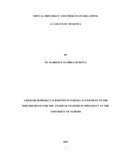| dc.description.abstract | There is no country in the world that has managed to set up diplomatic missions in all the
United Nations 193 member states. This is because of lack of resources and capacity to
establish embassies and consulates in all the countries. There’s lack of ICT
implementation which is the real essence of technology, it reduces the time and space
required to administer public diplomacy. Kenya’s conduct of diplomacy has not been
able to adequately achieve its goals in advancing its economic, political, diaspora and
other interests abroad. This is because of its continuous reliance on traditional methods of
diplomatic practice. Virtual diplomacy will improve diplomatic services for developing
countries like Kenya which are not able to have physical embassies and consulates in all
foreign countries. That is why adopting virtual diplomacy to promote its national interests
in the international arena will narrow the gap and achieve so much with less. Virtual
diplomacy is a new phenomenon in the developing world. Kenya is an ICT hub, and is on
the path to be a ‘Silicon Valley’ in Africa. Kenya should adopt virtual diplomacy so that
it can realize the national interests and goals for the country. Virtual diplomacy is more
cost effective unlike the old diplomacy. The objective of the study was to identify ways
in which ministry of foreign affairs can apply virtual diplomacy in its conduct of
diplomatic activities. ICT and more specifically web 2.0 in the running of public
diplomacy. The specific objectives were; to explore how virtual diplomacy influences
power relations among states; to explore areas where Kenya government can apply
virtual representation in its diplomatic practice and to identify expected challenges in the
use of virtual diplomacy. The research looked at how the use of information
communications technology for development. The Actor Network Theory (ANT) guided
the study by examining how interaction of virtual diplomacy, which is technology driven,
interacts with traditional diplomacy that is driven by human beings. The theory analyzed
how technology influences interactions in the diplomatic practice. The research
methodology used the mixed methods approach. It combined both the qualitative and
quantitative methods. For the public or citizens, the researcher applied judgment
sampling. For data analysis, the researcher identified the main themes of the research to
form the sub-topics. The primary data was analyzed thematically based on the objectives.
The researcher also relied on secondary data to support the findings. The main setback in
the adoption of virtual diplomacy is cyber security and high risk of leaking confidential
information. The study concluded that virtual diplomacy influences power relations
among states, especially in Kenya. Through virtual diplomacy, countries can setup
embassies in the online space that are cost effective and eliminate expenses of
maintaining diplomatic missions in all countries where they have interests. | en_US |



